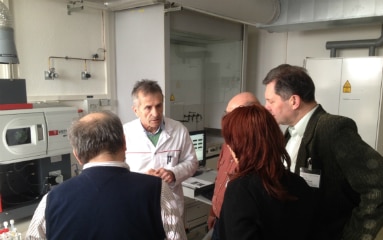
Switzerland is supporting Slovakia in its efforts to identify, assess and analyse hazardous chemical and radioactive substances. It is providing Slovak specialists with advanced technical training and has provided the funding to invest in modern measurement and analysis equipment for the three national chemical laboratories. The training is being carried out by the SPIEZ LABORATORY, the Swiss national institute responsible for the protection of the population against nuclear, biological and chemical threats and risks. The aim of the partnership is to exchange experiences and knowledge in the field of radioactive and chemical substances.
At the beginning of February 2015 five senior and technical staff from the three national laboratories in Slovakia received training at the SPIEZ LABORATORY in fields such as radioactive analysis and nuclear forensics. This was the second training module of this kind, following the first in October 2013. Last year a delegation from the SPIEZ LABORATORY travelled to Slovakia to get an idea of the Control Chemical Laboratory in Slovakia.
Both delegations describe the partnership as very valuable and helpful. This partnership is not only beneficial for Slovakia, which gains from Swiss experience and expertise, but is also of great interest to Switzerland because the management of chemical and radiological events in other parts of Europe also affects Switzerland. The smuggling of radioactive substances and nuclear terrorism do not stop at borders and are potential threats for Switzerland too. In addition, Slovakia forms part of the EU and Schengen external border, and Switzerland can contribute to improving its defence.
This Swiss-Slovak partnership came into being because natural disasters as well as criminal and terrorist threats in Slovakia have increased, and the country lacks the necessary technical equipment and the latest expertise in some areas to deal with such situations.

